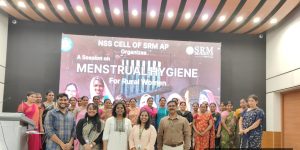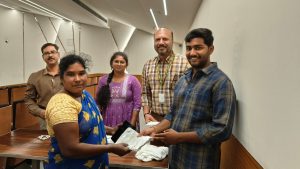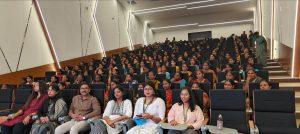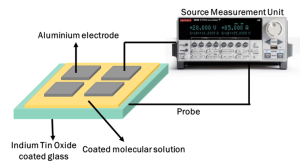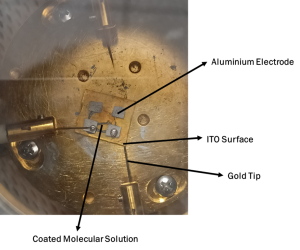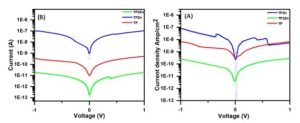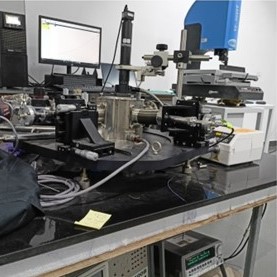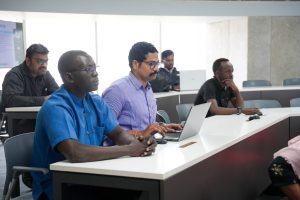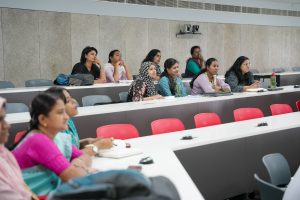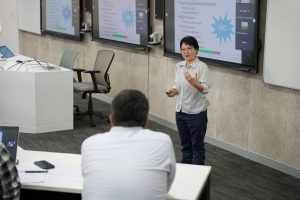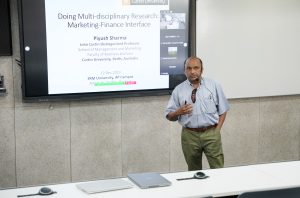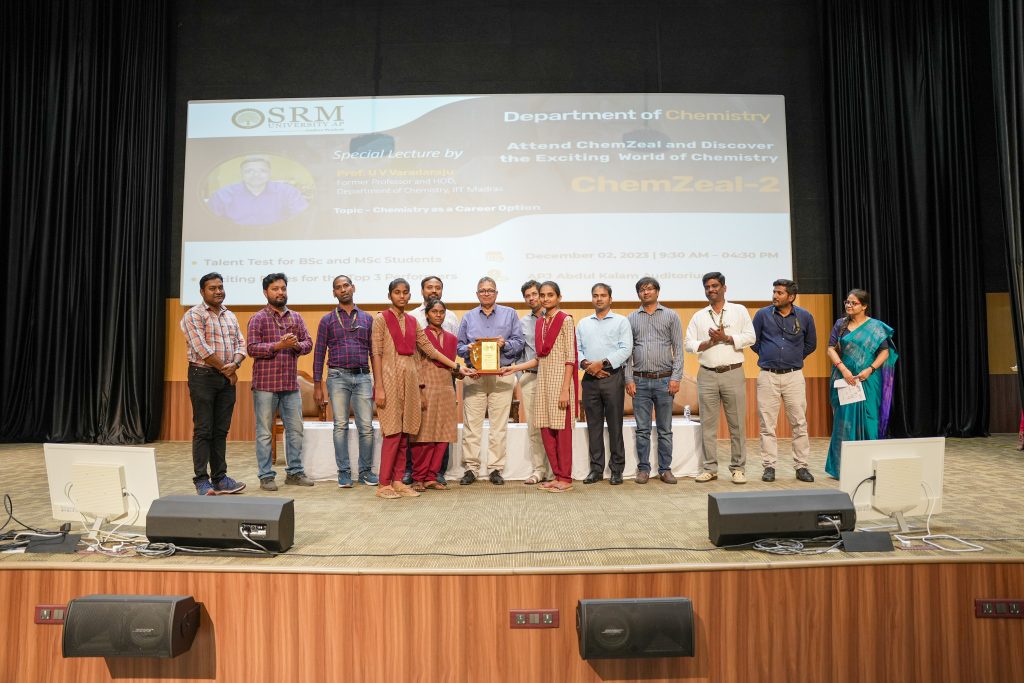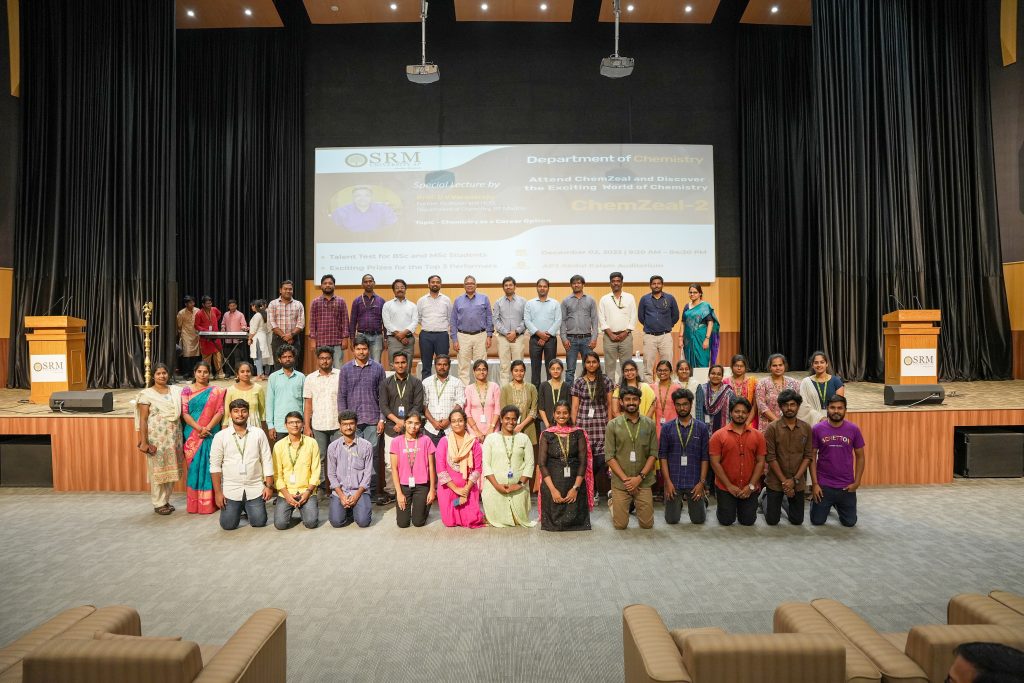NSS Cell Illuminates Women on Menstrual Hygiene
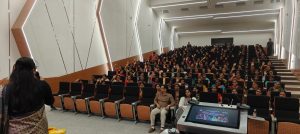 In a dedicated effort towards community welfare, the NSS Cell of SRM University-AP orchestrated a transformative awareness session on Menstrual Hygiene for rural women. Delivered by our esteemed University Counsellors, the session aimed to empower and educate women from nearby villages on essential menstrual hygiene practices.
In a dedicated effort towards community welfare, the NSS Cell of SRM University-AP orchestrated a transformative awareness session on Menstrual Hygiene for rural women. Delivered by our esteemed University Counsellors, the session aimed to empower and educate women from nearby villages on essential menstrual hygiene practices.
The engaging session delved into addressing the challenges faced by these women and dispelling myths surrounding menstruation. Harnessing the power of videos and captivating story narrations, the University Counsellors brought forth crucial information to raise awareness about this natural biological process.
Despite menstruation being a universal phenomenon, many rural women grapple with inadequate knowledge and resources, resulting in health complications, social stigma, and daily life limitations. The NSS Cell’s initiative sought to bridge this knowledge gap and provide practical insights.
Despite menstruation being a universal phenomenon, many rural women grapple with inadequate knowledge and resources, resulting in health complications, social stigma, and daily life limitations. The NSS Cell’s initiative sought to bridge this knowledge gap and provide practical insights.Through impactful story narrations, the session aimed to instill a sense of empowerment and confidence among the women, enabling them to manage menstruation with dignity. The Counsellors addressed prevalent myths surrounding menstruation, fostering an environment of openness, and understanding to eliminate social stigmas. Utilizing the visual medium, informative videos were showcased to provide a comprehensive understanding of menstrual hygiene practices. The overarching goal of this initiative was to ensure that every woman, irrespective of her background, gains access to vital information and resources for a healthier, stigma-free life.
SRM University-AP remains committed to its role as a catalyst for positive change, uplifting communities, and fostering holistic well-being.
- Published in Departmental News, News, student affairs news
Unveiling a Realm of Possibilities in the Field of Material Science
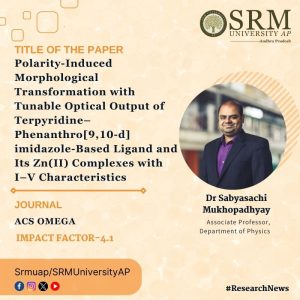 Dr Sabyasachi Mukhopadhyay, Associate Professor in the Department of Physics at SRM University-AP recently published a paper, titled “Polarity-Induced Morphological Transformation with Tunable Optical Output of Terpyridine–Phenanthro[9,10-d] imidazole-Based Ligand and Its Zn(II) Complexes with I–V Characteristics,” in the prestigious journal “ACS Omega.” Notably, “ACS Omega” is a Q1 journal with an impact factor of 4.1. This groundbreaking work delves into the polarity-induced morphological transformations and tunable optical outputs of Terpyridine–Phenanthro[9,10-d] imidazole-based ligands and their Zn(II) complexes. The study also explores their I–V characteristics, contributing valuable insights to the realms of materials science and chemistry.
Dr Sabyasachi Mukhopadhyay, Associate Professor in the Department of Physics at SRM University-AP recently published a paper, titled “Polarity-Induced Morphological Transformation with Tunable Optical Output of Terpyridine–Phenanthro[9,10-d] imidazole-Based Ligand and Its Zn(II) Complexes with I–V Characteristics,” in the prestigious journal “ACS Omega.” Notably, “ACS Omega” is a Q1 journal with an impact factor of 4.1. This groundbreaking work delves into the polarity-induced morphological transformations and tunable optical outputs of Terpyridine–Phenanthro[9,10-d] imidazole-based ligands and their Zn(II) complexes. The study also explores their I–V characteristics, contributing valuable insights to the realms of materials science and chemistry.
Abstract
Self-assembled nanostructures obtained from various functional π-conjugated organic molecules have been able to draw substantial interest due to their inherent optical properties, which are imperative for developing optoelectronic devices, multiple-color-emitting devices with color-tunable displays, and optical sensors. These π-conjugated molecules have proven their potential employment in various organic electronic applications. Therefore, the stimuli-responsive fabrication of these π-conjugated systems into a well-ordered assembly is extremely crucial to tuning their inherent optical properties for improved performance in organic electronic applications.
To this end, herein, we have designed and synthesized a functional π-conjugated molecule (TP) having phenanthrol [9,10-d] imidazole with terpyridine substitution at the 2 position and its corresponding metal complexes (TPZn and (TP)2Zn). By varying the polarity of the self-assembly medium, TP, TPZn, and (TP)2Zn are fabricated into well-ordered superstructures with morphological individualities. However, this medium polarity-induced self-assembly can tune the inherent optical properties of TP, TPZn, and (TP)2Zn and generate multiple fluorescence colors.
Particularly, this property makes them useful for organic electronic applications, which require adjustable luminescence output. More importantly, in a 10% aqueous-THF medium, TPZn exhibited H-type aggregation-induced white light emission and behaved as a single-component white light emitter. The experimentally obtained results of the solvent polarity-induced variation in optical properties as well as self-assembly patterns were further confirmed by theoretical investigation using density functional theory calculations. Furthermore, we investigated the I− V characteristics, both vertical and horizontal, using ITO and glass surfaces coated with TP, TPZn, and (TP)2Zn, respectively, and displayed maximum current density for the TPZn-coated surface with the order of measured current density TPZn > TP > (TP)2Zn.
This observed order of current density measurements was also supported by a direct band gap calculation associated with the frontier molecular orbitals using the Tauc plot. Hence, solvent polarity-induced self-assembly behavior with adjustable luminescence output and superior I−V characteristics of TPZn make it an exceptional candidate for organic electronic applications and electronic device fabrication.
Research Explanation
Our investigation is based on the electron transport characteristics of molecules (voltage vs. current), which allows us to ascertain the molecule’s conductive capacities. The Janis probe station, which has four gold tips total is the primary instrument utilized in this investigation. To investigate the properties of electron transport, two gold tips were used: one in contact with an aluminum electrode and the other with an ITO surface. The current measurements for a given voltage of given molecules have been studied using a source measuring unit.
Application
- Our research study can be applicable to predict the good electron and hole transport layers for the Organic Light Emitting Diode (OLED) application.
- Organic field effect transistor (OFET) applications.
Collaborations
Dr. Priyadip Das, Associate Professor, Department of Chemistry,SRMIST
Pictures related to research
- Published in Departmental News, News, Physics News, Research News
Exploring Frontiers in 5-day FDP by Centre for Consumer Research
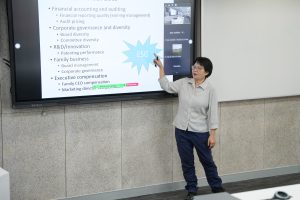 Centre for Consumer Research in India, under the aegis of Paari School of Business, recently organised a dynamic and contemporary five-day Faculty Development Program. This innovative program delved into cutting-edge topics, showcasing the forefront of consumer research.
Centre for Consumer Research in India, under the aegis of Paari School of Business, recently organised a dynamic and contemporary five-day Faculty Development Program. This innovative program delved into cutting-edge topics, showcasing the forefront of consumer research.
The hybrid-mode FDP witnessed enthusiastic participation from all PhD students and faculty members of PSB, fostering a vibrant environment of knowledge exchange. What added to the richness of this academic endeavor was the inclusion of 20 participants from various other prestigious B-schools.
Distinguished anchors for the FDP included luminaries in the field like Prof. Raj Sethuraman from Cox School of Business, Southern Methodist University; Prof. Ramkumar Janakiraman from Darla Moore School of Business, University of South Carolina; Prof. Piyush Sharma from the School of Management and Marketing, Curtin University, Australia; Prof. Tak Yan Leung, Associate Professor, School of Business and Creative Industries, University of the Sunshine Coast, Australia; Prof. Bharadhwaj Sivakumaran, Dean, Paari School of Business.
Speakers talked about new technologies in omni channel retail and big data in retailing, empirical models in Marketing. Then, Professors Piyush Sharma and Tak Yan Leung gave individual and personalized feedback to all participants on their research. Finally, Prof. Bharadhwaj Sivakumaran gave tips on how to publish papers on systematic literature reviews. All in all, it was a dream come true for participants; they soaked in a rich treasure trove of information from a globally acclaimed panel.
This collaborative initiative aimed to explore the evolving landscape of consumer research, bridging academic insights with real-world applications. The FDP not only enhanced the knowledge base of participants but also fostered a global network of scholars dedicated to advancing consumer research in India and beyond.
- Published in Departmental News, News, Paari Current Happenings
Dr Karthik Rajendran Honoured with Young Scientist Award
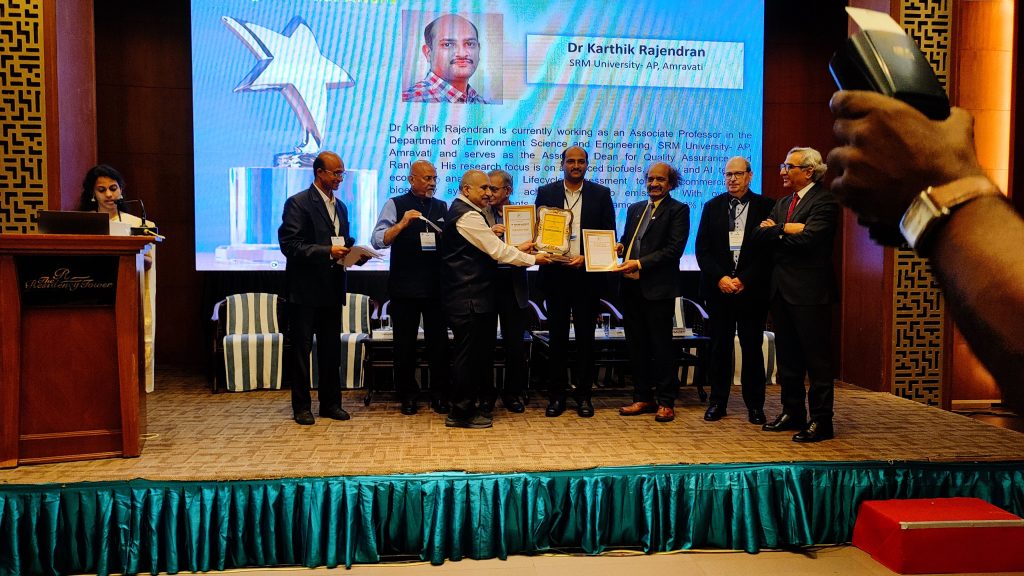
Dr Karthik Rajendran, Associate Professor, Department of Environmental Science & Engineering has been conferred with the Young Scientist Award from the Biotechnology Society of India. The award was received by Dr Karthik Rajendran from Padmashree Prof. GD Yadav (ICT Mumbai).
This prestigious award is given to scientists less than 35 years old for their work carried out in India. This is a testament to the work he has been doing at SRM University-AP for the last 4.5 years. The Jury of the award committee consisted of twenty-three experts across India and the Globe.
In the last 20 years of its inception, only once before such an award was given to any private institution.
- Published in Departmental News, ENVS News, News
MSc Environmental Science Students Attend Workshop on Sustainable Wastewater Management
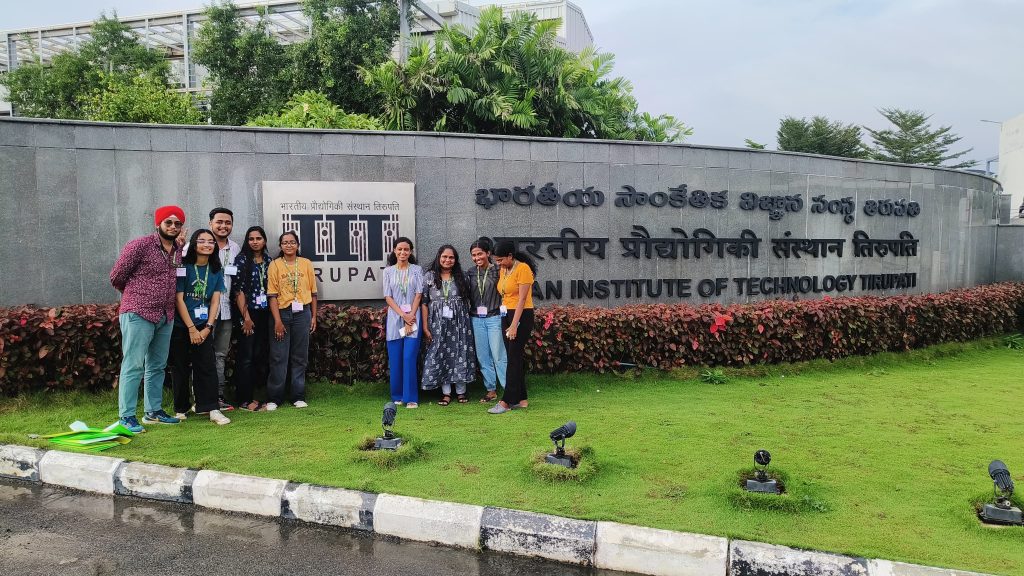
MSc Students from the Department of Environmental Science and Engineering had a delightful opportunity to participate in the Workshop on “Sustainable Wastewater Management: The Role of Advanced Treatment and Sensing Technologies” organised by the Department of Civil and Environmental Engineering, Indian Institute of Technology Tirupati on December 01 and 02, 2023. The students got to learn about novel technologies available for wastewater treatment and also visited three wastewater treatment plants at IIT Tirupati that showcased wastewater recycling technologies. Fruitful discussions with both academicians and industrial experts on current challenges in wastewater management and innovations and opportunities in the water sector were the highlights of the workshop.
- Published in Departmental News, ENVS News, News
Dr Karthik Rajendran Receives Hiyoshi Young Leaf Award
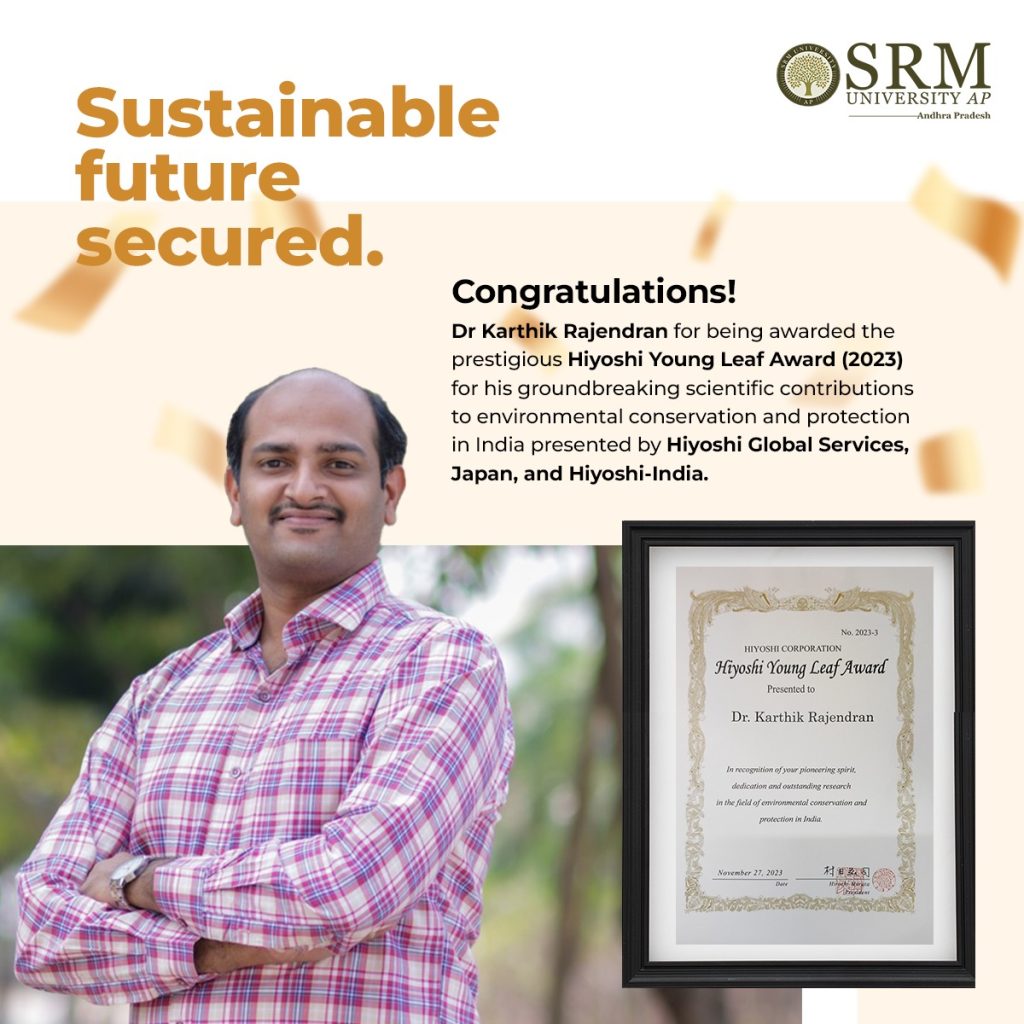
A proud moment for SRM University-AP as Dr Karthik Rajendran, Associate Professor in the Department of Environmental Science and Engineering, receives the prestigious Hiyoshi Young Leaf Award.
The Hiyoshi Young Leaf Award recognises novel, innovative, and outstanding scientific research and application in the field of environmental conservation and protection in India. Dr Rajendran’s dedication to research, innovative approaches, and impact on the academic community have earned him this esteemed accolade.
“We extend our heartfelt congratulations to Dr Karthik Rajendran for this well-deserved recognition,” said Prof. Manoj K Arora, Vice Chancellor, SRM University-AP. “His exemplary work reflects the varsity’s commitment to fostering excellence in the field of Environmental Science and Engineering.”
“It is a great honour to be receiving the Hyoshi Young Leaf Award, it motivates me further to work harder and with greater passion, I would like to thank Hiyoshi Corporation for presenting me with this award,” said Dr Karthik Rajendran.
Dr Rajendran has received several awards in the past for his remarkable contributions to the field of environmental science and engineering. He has been recognised as one of the top 2% of scientists by Stanford University and has also been honoured with the Young Scientist Award among others. Apart from his research, Dr Rajendran is also dedicated to educating the next generation of environmental scientists and engineers, thereby playing a crucial role in shaping future leaders in the field.
SRM University-AP celebrates this milestone in Dr Rajendran’s career and looks forward to continued excellence in his contributions to environmental science.
- Published in ENVS News, Faculty Achievements, News
A Research On Examining Stress Among Adolescents
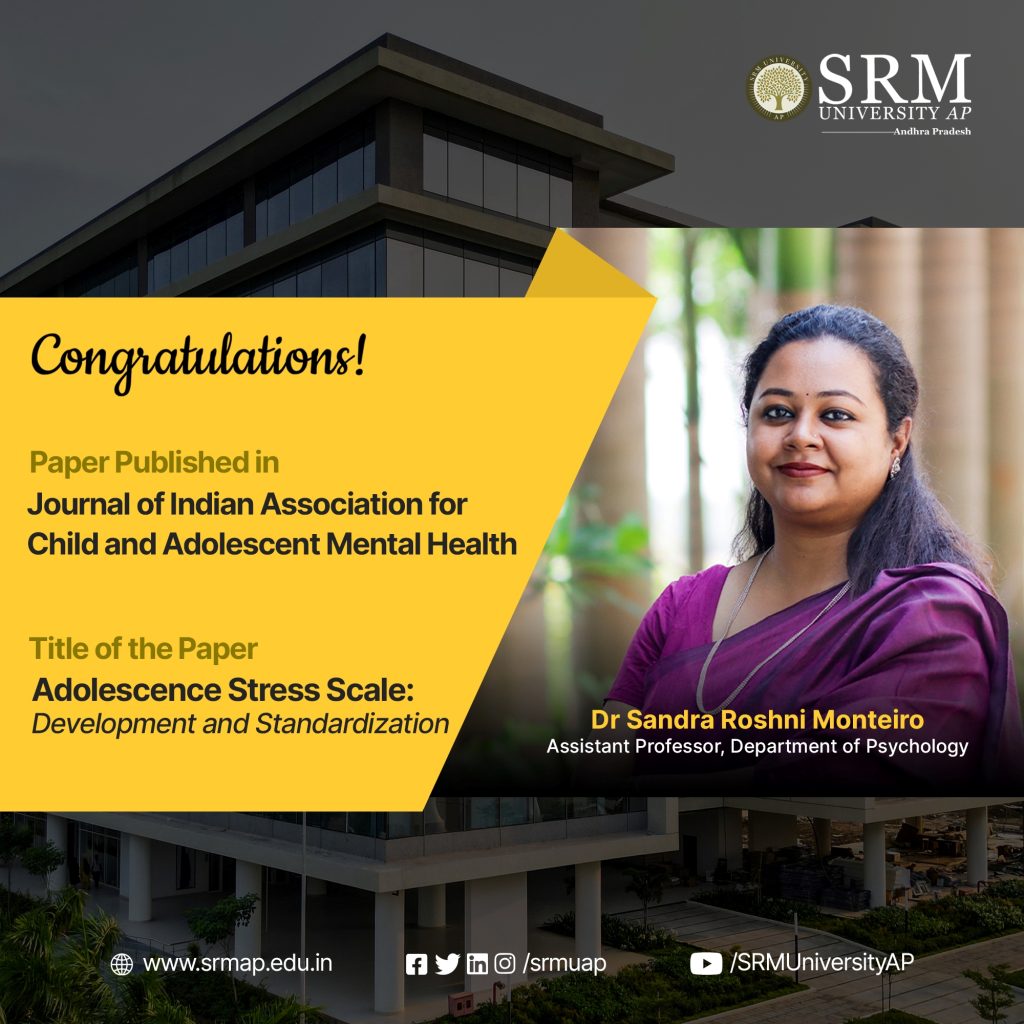
The research paper titled “The Adolescence Stress Scale: Development and Standardization” is a significant contribution to the field of psychology. The paper by Dr Sandra Roshni Monteiro, Assistant Professor at the Department of Psychology in SRM University-AP featured in The Journal of Indian Association for Child and Adolescent Mental Health and provides a detailed account of the development and standardisation of the scale, highlighting its importance and relevance. Dr Monteiro has developed a comprehensive stress scale that aims to evaluate the psychometric issues faced by school-going adolescents.
Here’s a brief extract of the paper.
Abstract
Background/Aim
The objective of the paper was to develop a comprehensive “Adolescence Stress Scale” and to examine different psychometric issues in the development, initial validation, and standardization of this scale.
Method
Exploratory factor analysis was conducted on the data procured from a sample of 634 (11–18 years) school-going adolescents in India.
Results
An exploratory analysis provided a 10-factor structure, namely, major loss-induced stress, enforcement or conflict-induced stress, phobic stress, interpersonal conflict-induced stress, punishment-induced stress, illness and injury-induced stress, performance stress, imposition-induced stress, insecurity-induced stress, and unhealthy environment-induced stress. The 10 oblique factor solutions are found to be interrelated and interdependent with good indices of internal consistency, and content validity.
Conclusions
This scale development is a novel and powerful measure that taps onto various aspects of stress experienced by school-going adolescents. The scale can facilitate researchers, clinicians, and teachers to identify and quantify the significant sources of stress in adolescents in school, or clinic settings.
- Published in Departmental News, News, Psychology News, Research News
ChemZeal 2: An Outreach Initiative by the Dept. of Chemistry
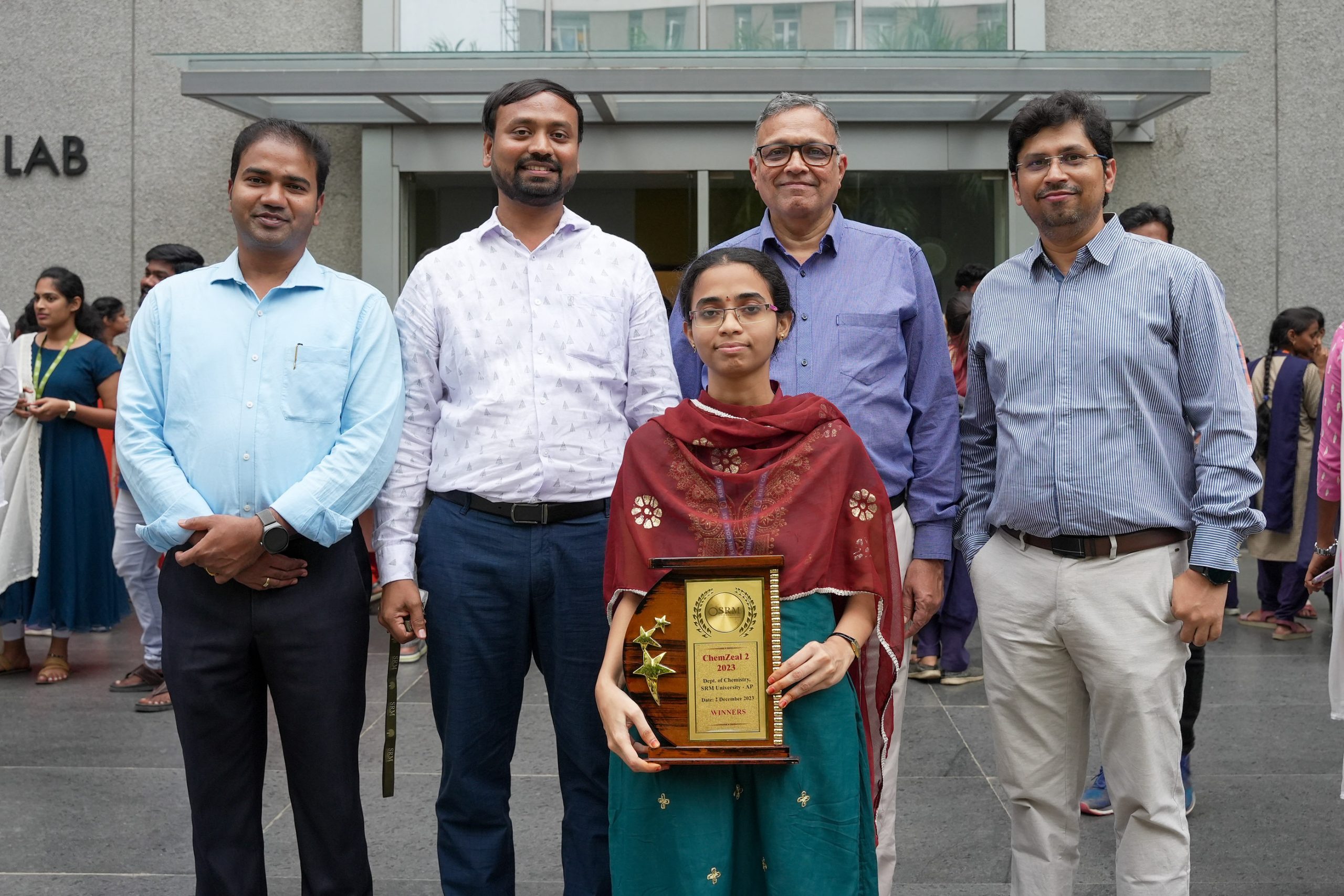
The Department of Chemistry at SRM University-AP organised an academic colloquium called ChemZeal 2 on December 02, 2023. The event aimed to promote the Department and its research among undergraduate and graduate students from various colleges. It also provided a platform for students to interact with chemistry enthusiasts and learn about the latest advancements and research in the field.
ChemZeal 2 featured a lecture by academic stalwart, Prof. U V Varadaraju on Solid-State Materials in Chemistry from the Department of Chemistry, IIT Madras. Prof. Varadaraju also spoke about various aspects of the field, including research, career paths, higher studies, and job opportunities in the industry.
The welcome note was given by the Department Head, Dr Pardha Saradhi Maram, while Vice-Chancellor Prof. Manoj K Arora and Prof. Jayaseelan Murugaiyan, Associate Dean in-charge (Science), also addressed the gathering with their valuable inputs. The event also included an interactive session with the guest speaker, where faculty and students could interact and get expert insights.
ChemZeal 2 also featured a talent test for over 320+ students from different colleges, with prizes awarded to the top three winners. The event was designed to attract students to pursue higher education and research in the field of Chemistry and provided a platform for BSc/MSc/PhD students to showcase their research and interact with potential candidates.
The event organisers – Dr Sabyasachi Chakrabortty (Convenor) & Dr J P Raja Pandiyan (Co-convenor) helped culminate the outreach activity with a campus tour, where attendees could witness state-of-the-art facilities, high-end research labs, and futuristic technology.
- Published in Chemistry-news, Departmental News, News
CCRI Lands First Industry Funded Project
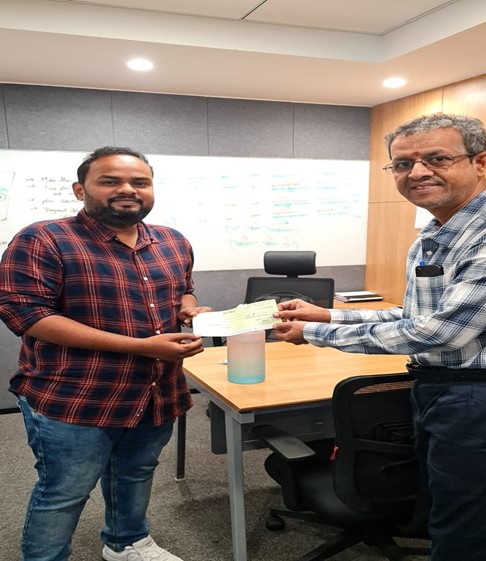
The Centre for Consumer Research in India (CCRI) has secured its first industry-funded project. Afterthought Feedback Services, a leading and eminent Marketing Research (MR) company in Hyderabad, funded a project titled “Awareness of Unhealthy Food Consumed by Indian Consumers: An Empirical Analysis” to the tune of Rs 1.5 lakhs. The project will be executed by Prof. Bharadhwaj Sivakumaran, Dr Mohd Danish Kirmani and Dr Vimal Babu. More than ten students from the BBA and MBA programmes would help in doing the project as well. The project would study the extent to which employees consume unhealthy food and suggest ways of making employees eat healthy food. Mr Rahul Pulupudi, CEO of Afterthought Feedback Services, handed over the cheque to Prof. Bharadhwaj Sivakumaran, Dean-Paari School of Business. CCRI thanks Afterthought Feedback Services for its kind gesture!
The project would be of help to the Paari School of Business in general and its students in particular; and also be of help to society at large.
- Published in Departmental News, Paari Current Happenings
SLP-E: Enhancing Privacy and Lifespan in WSNs for IoT
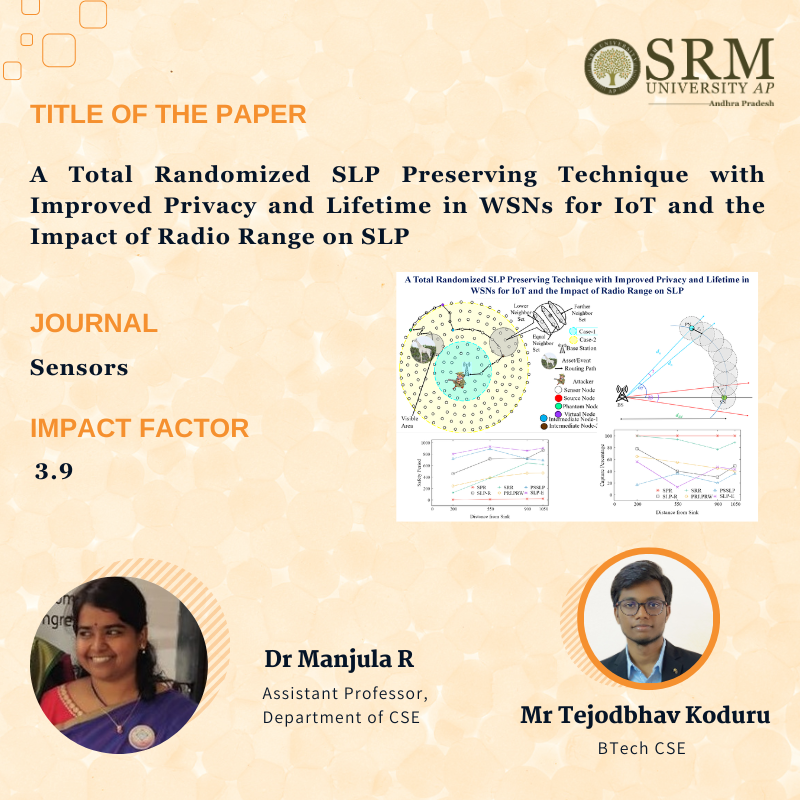
The Department of Computer Science and Engineering is thrilled to share that the paper titled, “A Total Randomized SLP Preserving Technique with Improved Privacy and Lifetime in WSNs for IoT and the Impact of Radio Range on SLP” has been published by Dr Manjula R, Assistant Professor, Department of CSE, and BTech-CSE Student Mr Tejodbhav Koduru in “Sensors“, a Q2 journal, having an Impact Factor of 3.9. Their research addresses the critical need for improved source location privacy and extended network longevity, presenting a pioneering solution known as Source Location Privacy with Enhanced Privacy and Network Lifetime (SLP-E).
Abstract
SLP-E utilises a unique combination of techniques, including a reverse random walk, a walk on annular rings, and min-hop routing, to diversify routing pathways within the network. Unlike existing SLP techniques that either prioritize privacy over network lifetime or vice versa, this approach aims to simultaneously enhance safety period, network lifetime, and privacy uniformly. Notably, this research also explores the impact of sensor radio range on Network Lifetime metrics and privacy strength within the context of SLP in WSN.
Practical Implementation/Social Implications of the research
This research holds real-world significance, especially in scenarios like protecting a lone white giraffe in Kenya fitted with a GPS tracker. Poachers pose a serious threat to such animals, hacking GPS devices to locate and harm them. This solution offers a viable approach to mitigate these threats, providing practical implications for the conservation of endangered species.
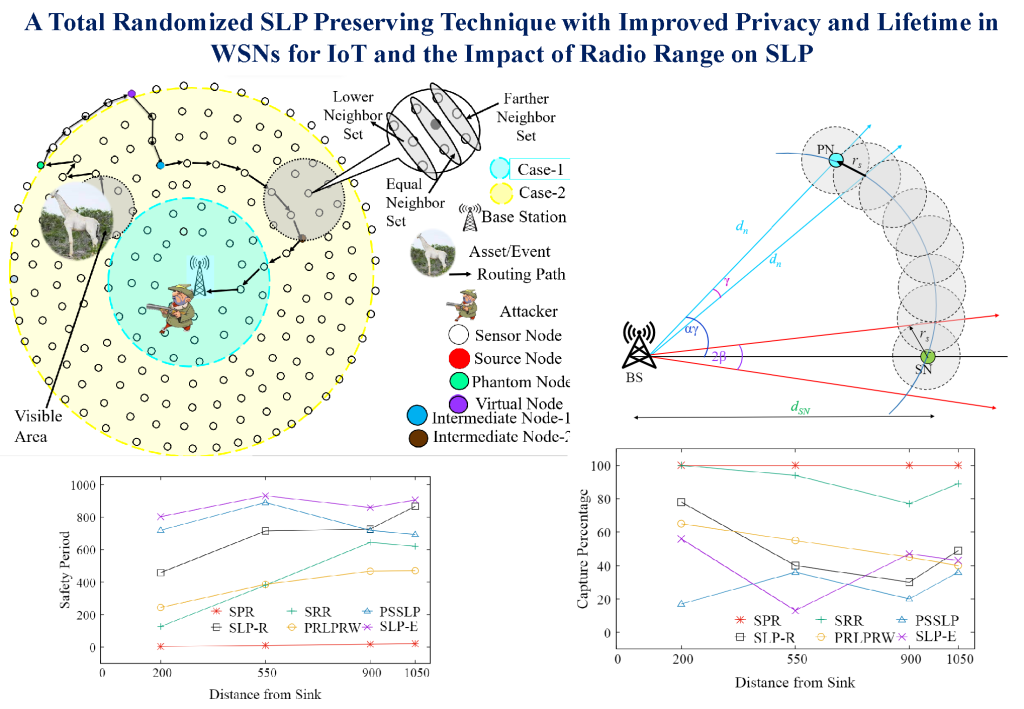
Collaborations
- Mr Tejodbhav Koduru from SRM University-AP
- Prof. Raja Datta from IIT Kharagpur
- Ms Florence Mukamanzi, Dr Damien Hanyurwimfura and Prof. Mukanyiligira Didacienne from the African Center of Excellence in the Internet of Things, University of Rwanda
- Published in CSE NEWS, Departmental News, News, Research News


